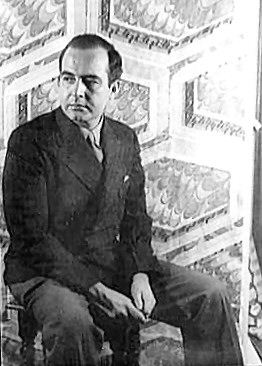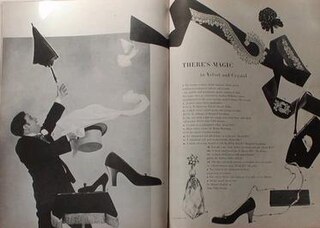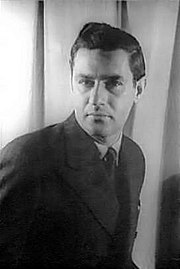
Thomas Schippers was an American conductor. He was highly regarded for his work in opera.

The Old Maid and the Thief is a radio opera in one act by Italian-American composer Gian Carlo Menotti. The work uses an English language libretto by the composer which tells a twisted tale of morals and evil womanly power. Menotti writes in the libretto "The devil couldn't do what a woman can – Make a thief out of an honest man."
Lucia Aliberti is an Italian operatic soprano singer. She performed the bel canto roles of Bellini, Rossini, Donizetti, Verdi, Puccini, Vivaldi, Mercadante and so on.

A Hand of Bridge, opus 35, is an opera in one act composed by Samuel Barber with libretto by Gian Carlo Menotti, and is possibly the shortest opera that is regularly performed: it lasts about nine minutes. It premiered as a part of Menotti's Festival of Two Worlds in Spoleto on 17 June 1959 at the Teatro Caio Melisso. The United States premiere occurred the next year. The opera consists of two unhappily married couples playing a hand of bridge, during which each character has an arietta in which he or she professes his or her inner desires.
Patricia Neway was an American operatic soprano and musical theatre actress who had an active international career during the mid-1940s through the 1970s. One of the few performers of her day to enjoy equal success on both the opera and musical theatre stages, she was a regular performer on both Broadway and at the New York City Opera during the 1950s and 1960s.

Antony and Cleopatra, Op. 40, is an opera in three acts by American composer Samuel Barber. The libretto was prepared by Franco Zeffirelli. It was based on the play Antony and Cleopatra by William Shakespeare and made use of Shakespeare's language exclusively.
Cornell MacNeil was an American operatic baritone known for his exceptional voice and long career with the Metropolitan Opera, which spanned 642 performances in twenty-six roles. Opera News opined he "was a great baritone in era of great baritones — Warren, Gobbi, Merrill, Milnes — and in the contemporary press, comparisons to his colleagues were frequent. But MacNeil's performances had singular musical richness, and moral and intellectual complexity that were his alone. MacNeil may have had rivals, but he had no equals."
Werner Torkanowsky was a German-American conductor, composer and violinist.

Christopher Keene was an American conductor.
Rosemary Kuhlmann was an American operatic mezzo-soprano and Broadway musical actress best known for originating the role of the Mother in Gian Carlo Menotti's Amahl and the Night Visitors, the first opera commissioned for television. Kuhlmann portrayed the role on the annual live NBC broadcast of the production from 1951 through 1962.
Marie Powers (1902–1973) was an American contralto who was best known for her performance as Madame Flora in Gian Carlo Menotti’s The Medium, a role that she played on stage, screen and television.
Regina Sarfaty, later Regina Sarfaty Rickless after her marriage to Elwood A. Rickless in 1963, was an American operatic mezzo-soprano who had an active career during the 1950s through the 1980s. Sarfaty first rose to prominence through her work at the Santa Fe Opera and the New York City Opera during the late 1950s. She later enjoyed international success in the 1960s and 1970s, and had a particularly lengthy career singing with the Zurich Opera. Sarfaty died on December 23, 2024, at the age of 90.

Amelia al ballo is a one-act opera buffa by Gian Carlo Menotti, who set his own Italian libretto. Composed during 1936 when Menotti was in his mid-twenties, it was the composer's first mature opera and first critical success. The opera recounts a series of farcical events as a young Italian socialite overcomes obstacles to her attendance at the first ball of the season.

The Last Savage is an opera in three acts by composer Gian Carlo Menotti. Menotti wrote his own libretto, originally in the Italian language. The opera was translated into French by Jean-Pierre Marty for the work's first (private) performance at the Opéra-Comique in Paris on 21 October 1963, followed the next day by the public premiere. George Mead translated the work into English for the opera's American premiere at the Metropolitan Opera the following year.

The NBC Opera Theatre was an American opera company operated by the National Broadcasting Company from 1949 to 1964. The company was established specifically for the purpose of televising both established and new operas for television in English. Additionally, the company also gave live theatrical presentations of operas, sponsoring several touring productions in the United States and mounting works on Broadway.

Andrew McKinley was an American operatic tenor, violinist, arts administrator, music educator, and school administrator. Although he mainly performed in the United States, he had an active international singing career with major opera companies and symphony orchestras from the 1940s through the 1960s. His repertoire spanned a wide range, from leading tenor parts to character roles.

Leon Lishner was an American operatic bass-baritone. He was particularly associated with the works of Gian Carlo Menotti, having created parts in the world premieres of four of his operas. He performed in many productions with the New York City Opera and the NBC Opera Theatre during the 1950s and early 1960s.
Gloria Lane Krachmalnick was an American operatic mezzo-soprano who had an active international performance career from 1949 to 1976. In her early career she distinguished herself by creating roles in the world premieres of two operas by Gian Carlo Menotti, the Secretary of the Consulate in The Consul (1950) and Desideria in The Saint of Bleecker Street (1954); both roles which she performed in successful runs on Broadway and on international tours. For her performance in The Consul she was awarded a Clarence Derwent Award and two Donaldson Awards.
Spiros Argiris was an orchestral and operatic conductor.

Gian Carlo Menotti was an Italian-American composer, librettist, director, and playwright who is primarily known for his output of 25 operas. Although he often referred to himself as an American composer, he kept his Italian citizenship. One of the most frequently performed opera composers of the 20th century, he wrote his most successful works in the 1940s and 1950s. Highly influenced by Giacomo Puccini and Modest Mussorgsky, Menotti further developed the verismo tradition of opera in the post-World War II era. Rejecting atonality and the aesthetic of the Second Viennese School, Menotti's music is characterized by expressive lyricism which carefully sets language to natural rhythms in ways that highlight textual meaning and underscore dramatic intent.









